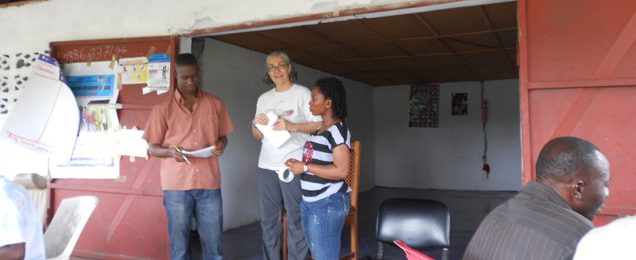

As a medical anthropologist, just back from two months in Liberia working on behalf of the World Health Organization (WHO), I was featured as one of five experts in the September 25 issue ofTime Magazine, a prominent American weekly news magazine. Click here to see the full article.
In Liberia I had several roles: helping responders understand how local practices might help or hinder the spread of the disease; acting as WHO’s technical advisor to the Liberian government on psychosocial issues; and working with affected communities.
In the article, I describe “a lack of cultural sensitivity… I think the biggest mistake that occurred very early was that primary health care was ignored and communities were not included in their own health issues.” ”Programs were rolled out and people were told what not to do. No effort was made to ensure engagement and increase trust.” In fact, ”This disease attacks the best of [Liberians’] culture – that of touching and caring and kindness.”
How Focusing Practice and Community Wellness informed her work:
Monrovia, the capital of Liberia, with a population of more than a million, is crowded and in one of the poorest countries in Africa. Only a decade ago, Liberia was in the midst of a bloody civil war. During the last decade, its infrastructure was just starting to be developed, yet its health care system remained very fragile. And then, the tragedy of Ebola struck.
When compared to other experiences I have had (like Afghanistan), this was much worse. I’ve worked in war and natural disaster, but this is very different. This is scary. In war, you hear the rockets and you sense the direction danger might come from. Working in the context of an infectious disease is very different. You can never be sure that you are safe, or even where the danger lies. And an act of human kindness could get you infected as it has others.
My team of local researchers (college students whose school was closed because of Ebola) and I would walk into a community, encountering people who were very frustrated and scared. And we would sit in their midst and tell them:
“We are from the WHO and we need to know what you know. Because what you say is important, we brought a team to make sure we hear everything you have to say. We will write down whatever you need to tell us about Ebola and what is happening in your community.”
This was done with no judgment and no desire to hear anything in particular. Because of this openness and empathy, people had much to say. In one case, a woman in a middle class community told the team her story and feelings:
I thank God for the WHO to gather us here to talk. Those in hospital, pray for them! I am pleading with you for all the babies and the helpless pregnant women who get all those symptoms similar to Ebola. No hospital is open to help them! Two days ago, my niece was ready to deliver her baby and was having contractions so we took her in a taxi to a clinic outside the city because she needed a C-section. The doctor refused to see her and sent us all back to Monrovia.
When we got back to the city we went straight to the hospital but the doctor was afraid to see her. Because he was worried that she had Ebola, he would not even look at her and she and the baby died. Because of ‘Ebola’ everyone is afraid of every illness and women have it the hardest. We have plenty of pregnant women and no one stops women from getting pregnant or helps to deliver the babies. I appeal to help all the pregnant women in the country.
What I learned (yet again) is that, even though I could not help this woman directly, she could listen – with all my heart and with empathy. I could use my skills as a Focuser to listen to people, help them feel heard and that helped change things.
The process was like a Focusing session:
As part of the process, I also invited the group/community or individual to ask any question they wanted of the team. This allowed for open sharing and mutual discovery. Asking them: Is there more there?
I have now been back in the US long enough to have completed the 21 days of self-monitoring of my temperature. No fever and no other problems. But I reflect daily on this experience, on the people I met, those with whom I laughed and joked. I miss the friends I made there and I can only wish them well. That they not only survive but that they thrive.
Copyright © 2024 - Focusing Initiatives International, All Right Reserved. - Privacy Policy, how we process your personal data.